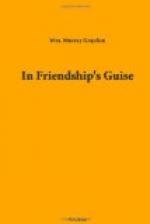“Oh, Mr. Vernon, ’ave you ’eard?” she exclaimed. “There was a ’orrible murder last night! I do pity the poor, dear creature—”
“I don’t want to be shocked,” Jack curtly interrupted. “Murders are common enough. But you might send me up a paper.”
“And you won’t ’ear—”
“Not now, my good woman.”
Mrs. Jones put down the tray, tossed her head, and departed in a huff. The paper arrived five minutes later, and Jack glanced over it while he sipped his coffee. One of the inside pages suddenly confronted him with huge headlines: “The Beak Street Murder!” He read further down the column, and his face turned as pale as ashes; he swayed in his chair.
“My God!” he cried. “It is Diane!”
The report of the affair was enlarged from a briefer account that had appeared in a late edition on the previous night. It seemed that Mrs. Rickett, the landlady and proprietress of 324 Beak street, had discovered the crime at a quarter to ten in the evening. A red stain, coming through the ceiling of her sitting-room, attracted her attention. She went to the room overhead, which was occupied by a female lodger calling herself Diane Merode. The door was locked, and her demands for admittance brought no response. She promptly summoned the police, who broke in the door and found the unfortunate woman, Merode, lying dead in a pool of blood. She had been stabbed to the heart by a powerful blow dealt from behind.
“The murderer left no traces,” the Globe continued. “He carried off the weapon, and, after locking the door, he took the key. According to medical opinion, the deed was committed about half-past eight o’clock. At that time there were several other lodgers in the top part of the house, but they heard no noise whatever. Fortunately, however, there is a clew. Mrs. Ricketts, who was out making purchases for breakfast, returned about a quarter to nine. As she entered the doorway a man slipped by her and hastened in the direction of Regent street. She had a good look at him, and declares that she would be able to recognize him again. The police are searching for the suspected person.”
Jack’s breakfast was untasted and forgotten. His trembling hand had upset the coffee, spilling it over the paper. He felt cold in every vein, and his thoughts were in a state of wild chaos. It was hard to grasp the truth—difficult to realize the import of those staring headlines of black type!
“Diane murdered! Diane dead!” he repeated, vacantly. “I can’t believe it!”
After the first shock, when his brain began to throw off the numbing stupor, he comprehended the terrible fact. The crime gave him no satisfaction; it never occurred to him that he was a free man now. On the contrary, a dull remorse stirred within him. He remembered his wife as she had been five years before, when she had loved him with as much sincerity as her shallow nature would permit, and her charms and beauty had bound him captive by golden chains. There were tears in his eyes as he paced the floor unsteadily.




